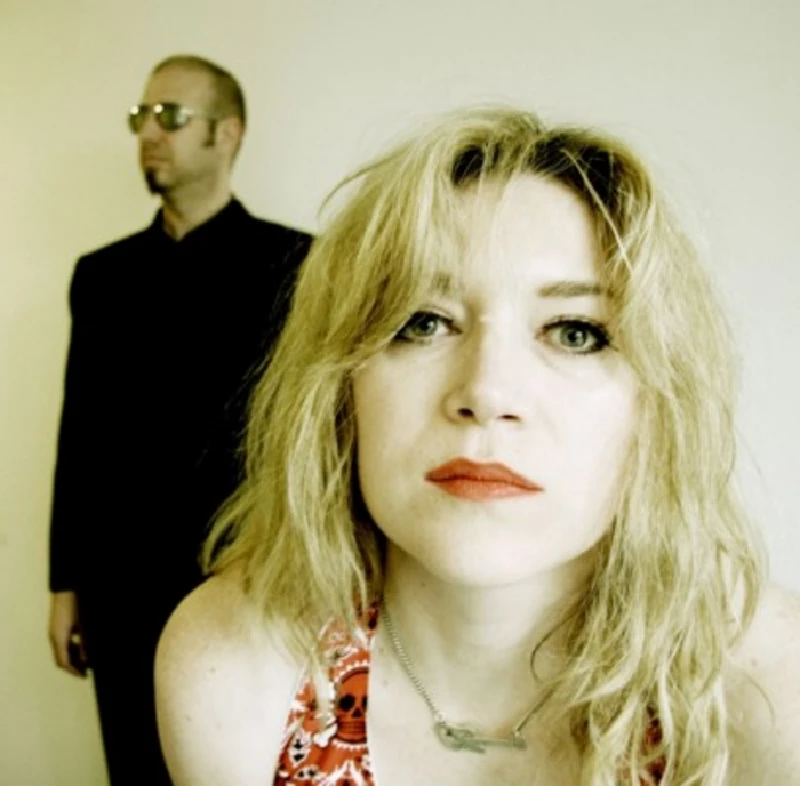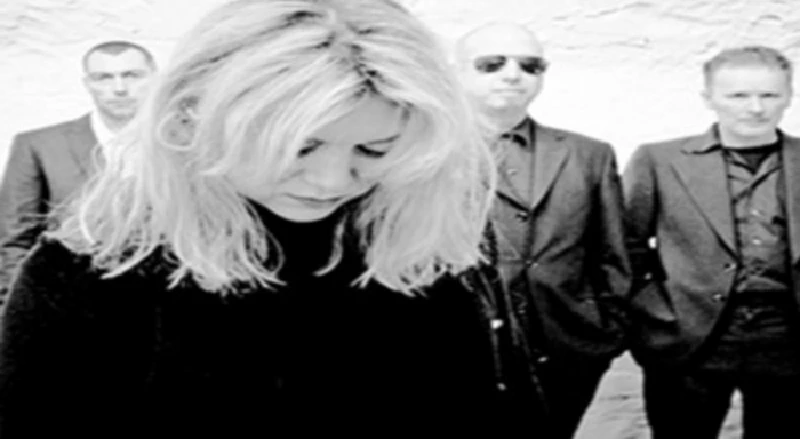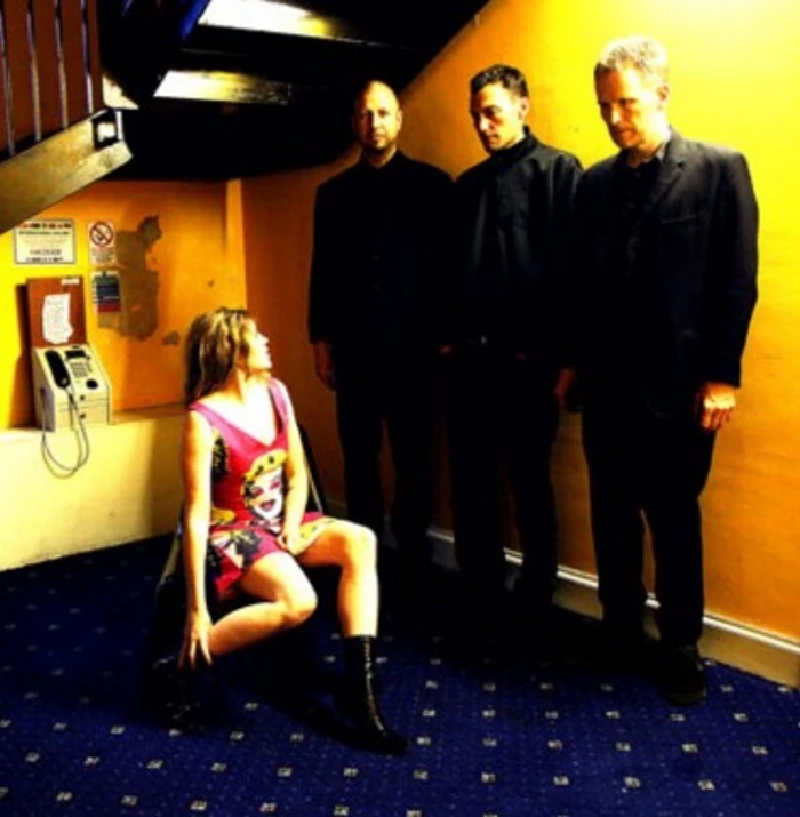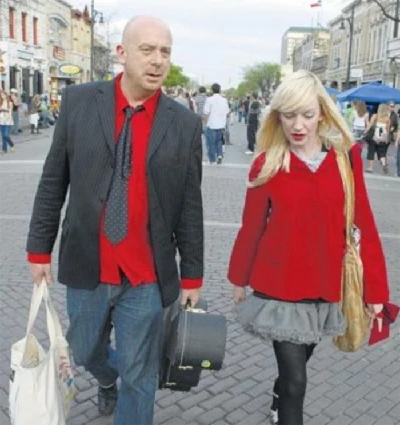Snowbird - Interview
by John Clarkson
published: 22 / 5 / 2009

intro
Edinburgh band Isa and the Filthy Tongues includes in its line-up former Goodbye Mr MacKenzie vocalist and guitarist, Martin Metcalfe, and American singer, Stacey Chavis. They talk about their recent single, which is the title track on the film 'New Town Killers', and their forthcoming second album
Martin Metcalfe has a talent for nurturing extraordinary female singers. The former frontman with brooding late 80s and early 90s Scottish post punks and cult act Goodbye Mr MacKenzie, Metcalfe's first discovery was Shirley Manson, who would go on to meet success as the singer with the internationally famous Garbage. Manson spent nine years between 1984 and 1993 playing as a keyboardist and backing vocalist in Goodbye Mr MacKenzie (or ‘The Mackenzies’ as they were known by their fans). She appeared on three of their four studio albums, 'Good Deeds and Dirty Rags' (Parlophone, 1988), 'Hammer and Tongs'(Radioactive, 1991) and 'Five' (Blokshok, 1993), but it was only towards the end of her tenure with Goodbye Mr Mackenzie, who while popular in Scotland never caught on across the UK or abroad, that Manson graduated to the role of frontwoman, duetting with Metcalfe on 'Normal Boy', one of the tracks on 'Five'. While their label Radioactive, an offshoot of MCA, dropped them before the release of 'Five' (which the band eventually issued on their own label), its owner, Gary Kurfirst, after hearing 'Normal Boy' and seeing the MacKenzies support Debbie Harry at a gig in Glasgow, expressed a desire to record an album with Manson. Kurfirst signed her to a solo deal, with the remaining members of Goodbye Mr Mackenzie, Metcalfe (guitar), Fin Wilson (bass) and Derek Kelly (drums), performing as her backing band to bypass their existing contract with MCA. This new set-up of the group, working under the moniker of Angelfish, released one self-titled album in 1994, which was produced by the Talking Heads' Tina Weymouth and Chris Frantz, and toured America, but broke up later that year. While Manson went on to international fame, after being spotted on MTV performing an Angelfish single, 'Suffocate Me' by the other members of Garbage - established American producers and musicians Butch Vig, Steve Marker and Duke Erikson - Metcalfe, Wilson and Kelly all returned home to their native Edinburgh. They recorded one last album as Goodbye Mr MacKenzie, the sub-standard 'The Glory Hole' (Blokshok) in 1995, before splitting up at the beginning of 1996. Metcalfe is sitting in the conservatory of a waterfront bar at the edge of the Leith district of Edinburgh. Stacey Chavis, his partner and the singer with his current band Isa and the Filthy Tongues, is seated opposite him. They are both just finishing eating lunch as they begin their interview with Pennyblackmusic. Metcalfe, who is 47, is wearing a black shirt and suit. The shock of blonde hair of his youth and Goodbye Mr MacKenzie's videos and photos shoots is gone. His head is shaven and he wears a goatee beard. His voice,surprisingly quiet and soft for someone who singing voice is deep and brassy-sounding, still belies his working class upbringing in the former mining town of Bathgate twenty five miles away. Stacey Chavis is from much further afield. She comes from Portland, Oregon, but moved to Scotland some years to be with Metcalfe and, as she told a previous interviewee, "to escape George Bush's America." Blonde and in her 30s, she is wearing a patterned T-shirt. There is a fresh-looking tattoo, a heart with the word 'Mom', inscribed on her arm. Chavis, like Manson, came to the role of front woman late. She had never been in a band before she joined the Filthy Tongues, which also features Fin Wilson and Derek Kelly, in 2005. With three of its former members involved, it is perhaps not surprising that Isa and the Filthy Tongues carry a similar dark underground sound to Goodbye Mr MacKenzie. A combination of rock 'n' roll, punk, surf music and psychedelia, their heavy guitar music has elements of the Velvet Underground, the Pixies, Echo and the Bunnymen and Iggy Pop. On their 2006 debut album, 'Addiction' (Circular Records), Chavis is an alluring, dynamic presence, whether brashly standing up for her own self-independence on ‘I’ll Do What I Want’, coldly dismissing the loudmouth who has dared to prejudge her on ‘Education’ or describing with spooky, surreal relish the sinister, disturbing dreams that haunt the narrator of ‘Dreamcatcher’. With all their releases to date having come out on small local labels with little in the way of marketing budgets, Isa and the Filthy Tongues, who only recently took on a publicist, have until now had to rely on word-of-mouth to make a presence. (This writer shame-facedly admit that, while Edinburgh-based and the owner of both Mackenzies and Angelfish CDs, he had missed out entirely on the Filthy Tongues until a couple of months before this interview took place.) 2009 is, however, shaping up to be a busy year for the band. Their last single, which has Metcalfe making a rare return to the fore as frontman, is the title song on former Skids singer and now film director Richard Jobson's new film, the Edinburgh-set thriller 'New Town Killers'. Their next single, 'Big Star', will appear on the soundtrack to a forthcoming Hollywood film, 'Spread'. 'Addiction' (Circular Records) is about to be reissued in a new extended edition, and the band's second album is due out on Neon Tetra Records later in the year. PB : Martin, there was a long gap between Goodbye Mr MacKenzie’s break-up in 1996 and the formation of Isa and the Filthy Tongues in 2005. What did you do in the time between ? Were you out of music ? MM : I was out of circulation in lots of different ways. I studied digital media and I was just getting my life back on course for a while. I stayed in close contact with Fin and Kelly from the MacKenzies and then we started getting serious about doing something again in maybe 2001 or 2002. We played together as the Filthy Tongues for a while and then when Stacey joined in 2005 became Isa and the Filthy Tongues. PB : Was it difficult getting back into music? MM : Not from a recording and writing point of view because I had kept my hand in. I did little bits and pieces. Digital media involves both audio and recording work, and I spent a lot of the late 90s playing little samples of loops and guitars into my computer and that kind of thing. I was always working away on something. PB : Goodbye Mr MacKenzie had been through a lot. You had been through various labels and managers and survived the departures of Rona Scobie (keyboardist, 1985-1992-Ed), John Duncan (guitarist, 1987-1993-Ed) and Shirley Manson. Why did you decide to call it a day after ‘The Glory Hole’ ? Despite everything, you were still attracting a decent audience at least in Scotland. MM : I was in a pretty bad way. I was in a more destroyed position than the rest of the band. Everybody had fallen away from the core at that point. We had got rid of our manager. We had stopped going to America with Angelfish and so by the end of 1995 it really felt like the end in a lot of ways. I gave up drinking and drugs in 1996 and then I had to start again basically. I had to start from the bottom in every way of my life really. I see ‘The Glory Hole’ as being a pretty warped kind of album. I had lost the capacity to be intellectual. There is a lot of kind of animal anger and disturbance on that, whereas ‘Five’ in contrast, which was the last thing that Big John did with us and Shirley did as a MacKenzie, I think is actually quite sophisticated. PB : Stacey, you hadn’t actually been in a band before. What kind of involvement had you had in music beyond being a fan before you joined Isa ? SC : Well, not much. I was involved in dance when I was in the States, so I was used to being on the stage at one level. While I actually hadn’t been in bands prior to this, most of my friends and probably just about every person I had dated had been in a band of some kind. I didn’t have the confidence really to do it. I thought that it was something that was just out for me. It was something that I wasn’t capable of doing. PB : What changed that ? SC : Getting older and meeting Martin. I had bought a guitar and started playing and writing my own music before I met Martin. Martin and I then started playing some music together. I had moved here by that stage and then the other guys, Fin and Derek, heard some of our recordings and liked what we were doing and things went from there. PB : Do you think that in some ways it helped you coming at it as someone in your early 30s rather than someone much younger and perhaps gave you a perspective that you might not otherwise have had ? SC : Probably. I am not concerned now about what other people think. I am more comfortable in my skin. It is easier for me to make decisions about what I like and what I don't like, and to put the boys in their place when need be (Laughs). PB : How aware were you of Goodbye Mr MacKenzie and Angelfish ? SC : I didn't really know who they were or how well known they had actually been, so I was a little bit thrown when I started playing and we actually had an audience. I wasn't really expecting an audience (Laughs), so I had to step up my game pretty quickly which I wasn't expecting to do. I was expecting that I was just going to be allowed to be aloof for quite a long time, to get myself comfortable and that wasn't the case at all. PB : Was that tough ? SC : It was intimidating at first. The guys were so laidback about it. They were like, "Oh, it's nothing", and I was terrified. Now I am fine with it. They were always truly supportive and great to be around. It became good very quickly. PB : In Goodbye Mr MacKenzie and Angelfish, Martin, the bulk of the songwriting credits went to you and Derek Kelly. The songs on Isa and the Filthy Tongues are, however, credited to all of you. How does the songwriting in the band work in contrast to Goodbye Mr MacKenzie ? MM : In the MacKenzies we went through various stages of writing. Derek and I would sit down with a drum machine and a keyboard and create these little pieces of music and then I would take them away and put little tunes on top. That was one way of doing it. The next big thing we did was the two of us would get together and I would drink about half a bottle of whisky and then sing whatever came into my head. Derek played bass by this point, so we got really into the idea of writing songs on bass and guitar, whereas before we were just playing around with keyboards. That was another way of doing it. Then when Stacey joined, she was working in Glasgow and she had to get up really early in the morning to get the bus through there at quarter to seven. She was really bored going back and forth to Glasgow on the bus and she used to come home with these little songs, so we would start playing them with just the lyrics and a tune, but without any backing music. I would then listen to the melody and then come up with some chords. It was the almost the reverse of the way that we started writing in the MacKenzies. SC : So most of my songs have been created out of boredom (Laughs). PB : Do you write the bulk of the lyrics these days as well ? SC : Yeah. PB : Martin, you once said that if Shirley Manson had been able to sing as well at the beginning of the tenure of Goodbye Mr MacKenzie you would never have been the front man. Is fronting a band something that you’re not really bothered about doing, despite having done it for a long time ? MM : Yeah. Put it this way ! I'll do it, but I don’t need it. In the beginning with the MacKenzies we had singer after singer and they all turned out to be unreliable and left the band. We had a great singer called Joe Cowan who left the band eventually, and at that point I just thought, "Screw this ! I am not having this inconsistency all the time, and having to hire someone else time after time." I, therefore, did it. It wasn't a need though. It was a practical thing to do at the time. SC : I don't think it was a case of whether Shirley could sing or not. She had an incredible voice. I think it was more a lack of confidence about whether she could be a front woman because you know you can hear in the background and the strength of her voice is beautiful. She has always had that really strong voice. It was more just like me, that confidence to be able to take the stage and to be the person that has the crowd paying most of the attention to. MM : She never ever pushed to the front and said, "When am I going to get to sing a song ?" The rest of the band eventually said to her, "What are you going to do here ? You can't be a backing singer all of your life." She had quite a modest rise to superstardom. Although she can be the centre of attention and very vivacious, it was initially an unnatural position for her to be in. She is much more comfortable with it now. PB : How much singing do you do now ? MM : I sang on ‘New Town Killers’ and there are a few songs that I sing on the next album that is going to be released. PB : How did you become involved with Richard Jobson ? You were on the same label, back in the late 80s, weren't you ?. MM : We were both on Parlophone. He was also doing a bit of media work and he was presenting a lunch time show on STV called 'The Garden Party'. The label arranged for us to be interviewed by him on the show and that was the first time we met him then. After that he came to a gig and he invited us to his album launch. That was in 1988, but then after that we didn't see him for a very long time. I was communicating with a guy, a friend of ours called Willie Richardson, who we had met on MySpace. He was in contact with Richard because he was involved in a film about T in the Park. There is a documentary coming out about T in the Park and the reformation gig that the Skids did there two years ago. Willie sent a copy of ‘Addiction’ to Richard. I don’t think he even mentioned us being ex-Goodbye Mr MacKenzie, but Richard loved the album. Our past didn't interfere with the way that he listened to the new record at all. He played it in the background a lot when he was writing his last film. We then arranged to meet him. He is just such a conclusive person. He looks for ways to involve people and artists that he likes with what he is doing. It was a really happy coincidence that we are back in the loop together. PB : 'Big Star', your new single, is also appearing on a soundtrack for another film, ‘Spread’, which is a Hollywood film, isn’t it ? SC :Yes. It is the next Ashton Kutcher romantic comedy, but it is very dark. MM : It is about the sex industry in America. We have done the film with Richard about violence and now we have done one about sex(Laughs). SC : It is going to be playing here at the Edinburgh Film Festival in June and then it will be released in America in August. It doesn’t have a release date here yet. The distribution rights haven't been bought, so hopefully that will happen after the film appears in the festivals in the UK. PB : How did you become involved with the soundtrack for that ? SC : Luck (Laughs). MM : My niece knew a guy from a club. He opened a club in Edinburgh and he booked us into it and then e-mailed me afterwards and asked us for music. He had been asked by this film director friend of his called David MacKenzie, who was Scottish and directed ‘Spreads’, to send him some stuff. It was, therefore, a friend of David MacKenzie's in Edinburgh who ran a club who liked us. There was really a lot more of an element of chance involved in that one. PB : You are also planning to reissue 'Addiction' in a new edition in June. In what ways is that going to be different from the first edition of it ? MM : It has 'Big Star'’ as an extra song and it ends with 'Finders Keepers', which is the radio version of ‘Finders F**kers’, which is also on that album. It is an electro mix. It also features a cover version of the Velvet Underground’s 'I Can't Stand It' that we recorded, and a few other demos that we did last year and we thought were good enough to appear on the repackage of that record. PB : When is the second album coming out ? MM : It will be August or September. PB : Do you have a title for it ? MM : 'Dark Passenger'. That comes from Stacey and I being TV couch potatoes (Laughs). We watch this programme, 'Dexter', which is about a serial killer who kills other killers. Dexter is talking on an episode of it with this other psychopathic woman about how they both have shadows in their past and personalities. He refers to these shadows as being “the dark passenger,” which is an alternative self, a dark self. How powerful that passenger is depends on the person. In his case it means tying people up in cellophane and slitting them open (Laughs). SC : But to his credit they are baddies (Laughs). MM : Yeah, everyone he kills are baddies (Laughs). SC : I like our first album, but this new one has a bigger perspective. It is more mature. On the first album I was still getting to know Derek and Kelly as people. I am much more comfortable with them and they are more comfortable with me now, so we are all more open to suggestions in the band about how to make it better . I think that it is much more of a solid record as a result. PB : Does it move in a different direction musically ? MM : Without it being weaker , it is at some points softer. That doesn’t mean we are going in that direction for ever, but it is where we were at that time. There is a lot more of a melancholy sadness in it rather than the anger that was in the first one. A lot of things were going on at that time. SC : My mom died unexpectedly at the time we were recording the album. MM : And your grandmother as well. SC : And my grandmother. MM : Stacey’s mother really held their family all together. All these people split into different directions and factions after that, and on this record she was both grieving for that and for a life in America that wasn’t there anymore. SC : Yes, I went a bit crazy on this one (Laughs). MM : There were a lot of things swimming around in the pot for this one. In contrast, we also did this track with Richard doing a voiceover. It is about waiting for a bus in Edinburgh and Leith and the stuff that goes on Leith. It is just really a big moan about the trams and all the buses getting delayed and it is very funny (Edinburgh is suffering severe traffic problems as a result of a lengthy rolling programme to install trams-Ed). It is going to be a double LP. It is going to have a bonus CD with remixes and that track with Richard and his addiction on it. PB : How long did it take this album to come together ? MM : We recorded it in chunks really. We started it in June and then finished it in January, but we weren’t at it all the time. It was maybe three weeks, four weeks of solid work. PB : Final question. Once the album comes out, what are your plans after that ? SC : We’ll be touring live and we’re actually about to start material recording for our next album as well. MM : We’re also writing some stuff for Richard’s next movie as well. We’re trying to get together material for that. It was going to be called ‘Into the Valley’, but it is now going to be called ‘Helter Skelter’ It is about people in Dunfermline, who don’t have jobs or loads of choices, and who are exploited as a result into joining the army. There is one song called ‘Suicide Pimp’, which I thought was quite a good description for describing the recruitment programme of the army. We are also working on another track for it called ‘Kingdom of the Ice’ as well. Richard has actually got us working for him another movie as well, which is a film version of ‘MacBeth’ which is going to be done like ‘Sin City’. We have got a track called ‘Fake It’ which I think with it sound and lyrics will fit some of the imagery he wants. We are, therefore, going to be doing a lot of film work as well. PB : Thank you.
Picture Gallery:-



interviews |
|
Interview (2009) |

|
| The owner of the populat Bella Union Records, former Cocteau Twins guitarist, Simon Raymonde, back for a second interview with us, talks to Olga Sladeckova about his label and Snowbird, his and his partner, singer-songwriter Stephanie Dosen's new band |
most viewed articles
current edition
Carl Ewens - David Bowie 1964 to 1982 On Track: Every Album, Every SongArmory Show - Interview with Richard Jobson
Colin Blunstone - Thalia Hall, Chicago, 16/7/2025
Visor Fest - Valencia, Spain, 26/9/2025...27/9/2025
Bathers - Photoscapes 1
John McKay - Interview
Loft - Interview
Billie Eilish - O2 Arena, London, 10/7/2025
Robert Forster - Interview
Sir Tim Rice - Interview
previous editions
Heavenly - P.U.N.K. Girl EPManic Street Preachers - (Gig of a Lifetime) Millennium Stadium, Cardiff, December 1999
Beautiful South - Ten Songs That Made Me Love...
Oasis - Oasis, Earl's Court, London, 1995
Pixies - Ten Songs That Made Me Love...
Boomtown Rats - Ten Songs That Made Me Love....
Prolapse - Interview
Trudie Myerscough-Harris - Interview
Peter Perrett - In Dreams Begin Responsibilities Interview Part One
Simon Heavisides - Destiny Stopped Screaming: The Life and Times of Adrian Borland
most viewed reviews
current edition
Amy Macdonald - Is This What You've Been Waiting For?Sick Man of Europe - The Sick Man of Europe
Lucy Spraggan - Other Sides of the Moon
Phew, Erika Kobayashi,, Dieter Moebius - Radium Girls
Davey Woodward - Mumbo in the Jumbo
Alice Cooper - The Revenge of Alice Cooper
Bush - I Beat Loneliness
Suzanne Vega - Flying With Angels
Blueboy - 2
Cynthia Erivo - I Forgive You
Pennyblackmusic Regular Contributors
Adrian Janes
Amanda J. Window
Andrew Twambley
Anthony Dhanendran
Benjamin Howarth
Cila Warncke
Daniel Cressey
Darren Aston
Dastardly
Dave Goodwin
Denzil Watson
Dominic B. Simpson
Eoghan Lyng
Fiona Hutchings
Harry Sherriff
Helen Tipping
Jamie Rowland
John Clarkson
Julie Cruickshank
Kimberly Bright
Lisa Torem
Maarten Schiethart